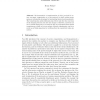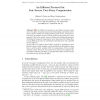14 search results - page 1 / 3 » Partial Fairness in Secure Two-Party Computation |
EUROCRYPT
2010
Springer
13 years 9 months ago
2010
Springer
A seminal result of Cleve (STOC ’86) is that, in general, complete fairness is impossible to achieve in two-party computation. In light of this, various techniques for obtaining...
CTRSA
2008
Springer
13 years 6 months ago
2008
Springer
In the setting of secure multiparty computation, a set of mutually distrustful parties wish to securely compute some joint function of their private inputs. The computation should...
EUROCRYPT
2003
Springer
13 years 9 months ago
2003
Springer
Abstract Benny Pinkas HP Labs Abstract. We demonstrate a transformation of Yao’s protocol for secure two-party computation to a fair protocol in which neither party gains any sub...
CTRSA
2008
Springer
13 years 6 months ago
2008
Springer
In the 1980s, Yao presented a very efficient constant-round secure two-party computation protocol withstanding semi-honest adversaries, which is based on so-called garbled circuits...
CORR
2010
Springer
13 years 3 months ago
2010
Springer
A protocol for computing a functionality is secure if an adversary in this protocol cannot cause more harm than in an ideal computation where parties give their inputs to a truste...


